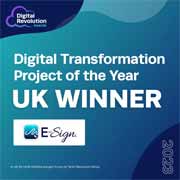Home | News & Insights |
Cutting Carbon in Your Supply Chain: Effective Strategies for Impact
Laura Cain
Marketing & Brand Manager
PUBLISHED
13th August, 2024
Climate change and its impact has become one of the most important global issues of the 21st century. The process of reducing carbon emissions for businesses has never been more essential, especially as the UK government introduced its Net Zero target by 2050.
With studies showing that, 70% of a company’s carbon emissions comes from the supply chain, we’ll be exploring the importance of carbon reduction including the steps organisations can take to minimise their emissions. And how a digital solution like E-Sign can support businesses with their sustainability efforts.
What is a carbon footprint?
A carbon footprint quantifies the carbon dioxide emissions generated by different activities. These emissions arise from various sources, such as transportation and production. All businesses consume energy to produce goods, offer services, and conduct their operations, which inevitably leads to increased carbon emissions. However, organisations globally are striving to reduce their carbon emissions to mitigate their environmental impact and support a more sustainable future.
How can businesses reduce their carbon emissions?

There are many useful ways in which organisations can reduce their carbon emissions and work towards the government’s net zero goals.
Switch to renewable energy sources
Energy is a big contributor to carbon emissions as it largely relies on fossil fuels to generate power for businesses. There are an increasing number of green energy providers offering affordable renewable energy services. If your current energy provider does not offer renewable energy, it is beneficial to research providers who can guarantee that their power only comes from sustainable sources.
It’s important that any provider you choose offers this guarantee. If they don’t, your energy could come from various sources, which may not all be renewable. Switching to renewable energy sources for your power is a key step in long term carbon reduction in your business. As well as potentially offering cost savings through less wasted energy.
Online meetings and remote working
Since the COVID-19 pandemic, many organisations have adopted hybrid and fully remote working models for employees. As a result there is no longer a need to commute to offices, which is an effective way to reduce carbon emissions. In addition, the hybrid working model has led to meetings being carried out online rather than in person.
Online meetings and events are more environmentally friendly as they remove the necessity for long-distance travel. With travel accounting for around 20% of global emissions, this transition benefits businesses significantly. By hosting meetings virtually, companies can decrease their carbon footprint and cut down on travel costs.
Invest in green office equipment
Another area in which businesses can reduce their carbon emissions is in the office equipment they use. Investing in more sustainable office equipment will help you to minimise your carbon footprint during your day to day operations. Below are some green ideas to consider when investing in your office equipment:
- Only use kitchen appliances with a high energy rating.
- Change to LED lights and make sure to turn off all lights at the end of the day. Try to rely on more natural light as much as possible.
- Lower your office thermostat, doing so by just 1 degree can reduce energy for heating by around 13%.
- Enable energy saving/battery saving modes on all PCs and mobile devices.
Choose sustainable suppliers
Only using sustainable suppliers is another way businesses can lower their carbon footprint. 70% of a company’s carbon emissions comes from the supply chain, meaning it’s essential to review your supply chain and check that your suppliers are following sustainable practices. Even though you’re not involved in their operations, buying their products or services contributes to your own carbon footprint. Therefore, switching to greener suppliers can lower your organisation’s emissions.
How net zero can help businesses

As well as supporting global efforts to reduce the effects of climate change, implementing net zero strategies can help your business save money and successfully grow. An example of how this can be the case is in a study by Deloitte which showed that 55% of consumers have selected food and beverage brands that have environmentally sustainable practices and values. This report also found that 32% of consumers would pay more for goods and services if it helped the brands to reduce their carbon emissions. Taking this into account, reviewing your current strategies and introducing a more carbon neutral plan might benefit your business in multiple ways.
Enhance your business reputation
Introducing carbon neutral practices into your processes might help to strengthen your business reputation. This is because customers across the B2B and B2C markets expect companies they purchase from and interact with to make positive ethical decisions on their behalf. With sustainability being a key priority for many organisations, those who can demonstrate their commitment to carbon reduction often attract more customers and can stay one step ahead of their competitors.
Some examples of sustainable actions small businesses can undertake to get started with their carbon reduction are getting involved in carbon offsetting schemes. Such as planting trees, sourcing materials from local suppliers, and reducing waste where possible.
Reduce costs
Switching to renewable energy sources as we have explored earlier could be beneficial in saving costs as well as reducing carbon through lower utility bills. This can be achieved by moving to a green tariff or installing renewable energy generators such as solar panels.
Simply by reviewing how your organisation uses energy you could reduce consumption and costs. Other business costs can be minimised too, for example if your business uses company cars you could make savings by transitioning to electric vehicles instead of petrol.
Protect your business
Striving for net zero can help to protect your organisation from disruptions in the market or national changes. For example, by using electric vehicles you can ensure your business is covered against rising fuel costs and disruption to fuel supply chains. Additionally, utilising different energy sources like solar or wind can protect your business from any unexpected rises in energy costs.
Opportunity for investment
Reducing carbon to become net zero can help your business to as an attractive prospect for investors and shareholders that are interested in organisations with robust sustainable strategy. Investors are sometimes likely to consider businesses that don’t rely on fossil fuels as if there are supply chain problems, these organisations are less likely to be negatively impacted.
How E-Sign can support your carbon reduction journey
As an industry-leading provider of electronic signatures and digital document solutions, we understand the importance of sustainability and reducing the impact of climate change to leave the world in a better state than we found it.
Not only can we help businesses with their carbon footprint by enabling them to remove physical paper documents from their processes. But we also continually work on our own sustainability efforts and minimise our carbon emissions as much as possible. See some examples of our carbon reduction efforts below:
- Our Liverpool Waters office has been verified as Net Zero for the past 3 years, using locally generated heat through the district heat network and energy centre.
- The Liverpool office is also the first commercial building in the city to be connected to the Mersey Heat network. This network has a multi million pound energy centre that is capable of providing low carbon heating and hot water to thousands of homes and businesses across the city.
- E-Sign are members of the SME Climate Hub to help our sustainability journey. Their resources allow us to measure our impact and introduce new green initiatives and employee schemes.
- We have partnered with carbon offsetting firm Wanderlands to address the issue of fraud in the carbon offsetting market. With a fully digital solution created with blockchain technology.
How eSignatures can support your net zero journey
Whilst saving paper and reducing your company’s carbon footprint is a definite benefit of going digital, its certainly not the only one. Indeed, when your company makes the switch, it’s truly the best of both worlds; you can do your bit for the planet whilst benefiting from streamlined workflow and improved efficiency.
So how can your business benefit from electronic signatures and digital documents?
Save Money
Whilst paper may seem like a relatively small business expense, the cost of your paper supply can add up as the months and years progress. True, your business will have to pay a monthly or yearly fee for your digital signature, but overall, ditching paper-based processes and embracing modernising digital technology will save you money whilst maximising your productivity and profitability.
Increase Efficiency
If you’re still reliant on paper-based processes, it’s doubtful your business will be operating as efficiently as it could be. Switching between paper-based processes and digital elements is ineffective and time-consuming, adding additional steps that can be easily eliminated by keeping everything digital. Electronic signatures allow you to sign documents digitally, without the need for printing or scanning, so you can make the deals you need, without the administrative hassle.
Improve User Experience
As the world moves increasingly online, your clients and customers now expect to be able to do business digitally. Indeed, having to fill in and return paper documents makes life more difficult for both partnering businesses and customers; printing, scanning or faxing is no longer the most efficient way to do business. Using an electronic signature, documents can be signed and returned in a matter of clicks, resulting in convenience for your clients and quicker turnaround times for yourself.
Added Security
We operate with a secure by default infrastructure ensuring all our digital signatures are 100% verifiable, actually making advanced eSignatures more secure than handwritten signatures. Admin rights can allow you to set up different access for your teams, having control over what they can see and do. Best of all, you will no longer need filing cabinet full of documents that is open to security threats, as data is stored in our data centres in the UK.
Conclusion
Carbon reduction is essential for businesses, as it is only by everyone making their own positive contributions that we can truly make a difference in stopping the negative effects of climate change and support regeneration of the natural world around us.
E-Sign can help to support organisations with their carbon reduction efforts by providing a tailored, cost effective digital solution to meet their electronic signature requirements. Removing paper documents from your workflows can make a significant difference to your carbon footprint. As well as allowing your business to experience the multiple other benefits going paperless provides.
Contact us today and a member of our digital transformation team can discuss your requirements with you to ensure you get started on the right plan to meet your needs. Also, you can try E-Sign for yourself by registering for our 14-day free trial. This will allow you to learn more about the features and functionality of the platform and see how it can work for your business.
 Facebook
Facebook
 X (Twitter)
X (Twitter)
 LinkedIn
LinkedIn











